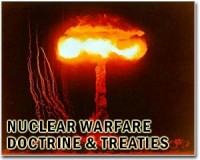 |
Paris (AFP) Dec 23, 2010 Nations on Thursday hailed the US ratification of a key treaty slashing US and Russian nuclear arsenals as a boost to international security in a new age of cooperation between the Cold War foes. The START treaty restricts the two nations to a maximum of 1,550 deployed warheads each, a cut of about 30 percent from a limit set in 2002, and 800 launchers and bombers. The Russian parliament could ratify it this week. British Foreign Secretary William Hague said Wednesday's ratification by the US Senate was "an important step towards our long-term goal of a world without nuclear weapons" and called on Russia to ratify the treaty as soon as possible. "The United States and Russia together have 90 percent of the world's nuclear arsenals and this treaty will contribute to increased trust and security for all," Hague said in a statement. France welcomed the move but called also for the ratification of a treaty banning atomic blast tests. The US ratification of the Strategic Arms Reduction Treaty after a months-long political battle was "an essential step towards this accord coming into force," foreign ministry spokesman Bernard Valero said. "Reducing Russian and American nuclear arsenals is indeed a disarmament priority, as these two countries still possess 95 percent of the world's nuclear weapons," he said. "France also calls for the ratification of the Comprehensive Test Ban Treaty (CTBT) so that this treaty, essential for disarmament, can come into effect," Valero added. The CTBT, which bans nuclear blasts for military or civilian purposes, was drawn up in 1996 and has so far been signed by a total 182 countries and ratified by 153. But nine key states, namely China, North Korea, Egypt, India, Indonesia Iran, Israel, Pakistan and the United States, still need to ratify it before it can come into force. Washington signed the treaty in 1996, but has yet to ratify it, although US President Barack Obama has said that Washington is committed to doing so. In Brussels, NATO Secretary General Anders Fogh Rasmussen said the ratification would "make a significant contribution to Euro-Atlantic security." "The foreseen reduction of US and Russian strategic nuclear weapons will pave the way for progress on conventional and nuclear arms control initiatives that would further enhance security in the Euro-Atlantic area and beyond," he added in a statement late Wednesday. Rasmussen and European leaders had rallied behind US President Barack Obama at a NATO summit in Lisbon last month, pressing the US Senate to pass the treaty amid reluctance among Republicans to approve it. Italian Foreign Minister Franco Frattini described the US approval of START as being of "historic magnitude." "This is a concrete step forward for nuclear disarmament in line with a vision of a safer world without nuclear weapons," he said in a statement. "It's a victory for everyone," he said, adding that the ratification showed "a new climate of trust and cooperation between the United States and Russia." Canadian Foreign Minister Lawrence Cannon said the treaty would "help advance weapons of mass destruction threat-reduction projects on which Canada collaborates with Russia and the United States."
Share This Article With Planet Earth
Related Links Learn about nuclear weapons doctrine and defense at SpaceWar.com Learn about missile defense at SpaceWar.com All about missiles at SpaceWar.com Learn about the Superpowers of the 21st Century at SpaceWar.com
 US Senate won't link START to seized Humvees
US Senate won't link START to seized HumveesWashington (AFP) Dec 21, 2010 The US Senate on Tuesday defeated an effort to tie a demand that Russia return five US military vehicles seized by its forces in the 2008 Georgia conflict to a landmark nuclear arms control treaty. Lawmakers voted 61-32 to set aside an measure by Republican Senator James Risch calling on Moscow to give back the Humvees before the new Strategic Arms Reduction Treaty (START) goes into force. ... read more |
|
| The content herein, unless otherwise known to be public domain, are Copyright 1995-2010 - SpaceDaily. AFP and UPI Wire Stories are copyright Agence France-Presse and United Press International. ESA Portal Reports are copyright European Space Agency. All NASA sourced material is public domain. Additional copyrights may apply in whole or part to other bona fide parties. Advertising does not imply endorsement,agreement or approval of any opinions, statements or information provided by SpaceDaily on any Web page published or hosted by SpaceDaily. Privacy Statement |